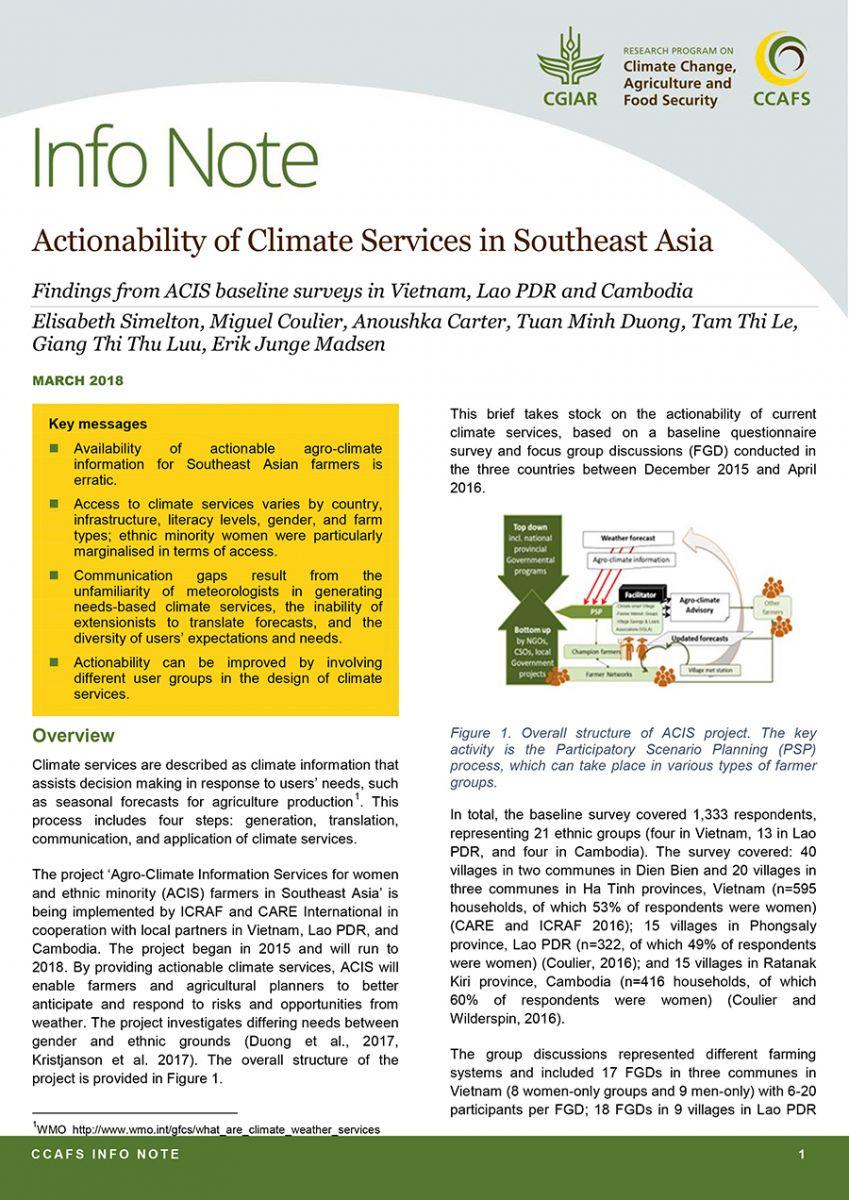Improved climate services a must for better decision making among farmers
The better climate services are, the more prepared farmers will be in adapting to climate variability.
A baseline study for the project, “Agro-Climate Information Services (ACIS) for women and ethnic minority farmers in Southeast Asia,” strongly suggests that climate services must better suit farmers’ needs for climate information.
Actionability of climate services, according to the study, can be improved by looking at the following factors:
- Availability
- Accessibility
- Timeliness
- Understandability
- Usefulness
Climate services are available in all three countries covered by the ACIS project. However, the study revealed issues around some of the factors above. For instance, ethnic minority women are especially at risk of experiencing marginalization, in particular due to language, and because extensionists more often meet with men. The study also found that meteorologists and extension officers often lack the necessary skills to package climate services in a more understandable manner for farmers.
To address these issues, the study calls for a more participatory approach in preparing climate services. Specifically, it suggests that:
- Participatory development of agroadvisories can adapt information to farmers’ needs and increase the communication between the forecast providers and technical advisors; and
- varied communication channels should be utilized and should answer to the farmers’ needs.
The study is reported through a CGIAR Research Program on Climate Change, Agriculture, and Food Security (CCAFS) Info Note. The ACIS project is being implemented by the World Agroforestry Centre (ICRAF) and CARE International in Vietnam, Cambodia, and Lao PDR.
Availability is less of a concern than accessibility
Relevant government offices in Vietnam, Cambodia, and Lao PDR provide seasonal forecasts, agro-advisories, and other climate services that to some extent can be utilized during crop seasons. National and community-based mass media such as television, radio, and village loudspeakers serve as platforms where these services are delivered to the people.
However, not everyone can easily access these platforms, let alone climate services. According to survey results, there are discrepancies between accessible platforms and preferred platforms. This implies that climate services are being delivered to platforms and in formats that do not necessarily fit the needs or preferences of the target end-users, i.e., the farmers.
"Delayed"
A majority of the surveyed farmers in all three countries prefer climate services that can be accessed before the planting season. Their preferences range from two weeks to three months prior to planting. In Dien Bien Province, Vietnam, for example, all ethnic minority groups want to access climate services two weeks to one month before they start conducting farming activities.
But their preferred timing is often not accommodated.
One out of two farmers in Lao PDR and Cambodia combined claimed that weather forecasts are delayed. One-third of the farmers in Cambodia lamented that they are never on time. The delays can be attributed to poor infrastructure, which results in interrupted power supply, subsequently leading to poor television and internet access.
The situation in Vietnam is different, however. Farmers in the provinces of Dien Bien and Ha Tinh said that agro-advisories are on time, helping them to take appropriate actions for their farming activities.
Understandable and useful
In general, the surveyed farmers understand climate services, particularly weather information and agro-advisories, but only to a limited degree.
For instance, a majority of farmers in Vietnam had “no opinion” regarding the understandability of agro-advisories. In Phongsaly, almost half of surveyed Laotians deemed weather information as “usually not” or “never” understandable. Language appears to be a primary barrier. Weather information is delivered in Lao, Thai, or Chinese languages. Men know these languages more than women do, and there is a lack of interaction between those who can understand and those who cannot.
In Ratanak Kiri, Cambodia, and in the two Vietnamese provinces, farmers suggested that government planning for climate services can benefit from information from farmers on what they really need; what they see as useful information; and what services apply in their situation. According to the study, providers should seek to answer the following to improve the usefulness of climate services:
- When and how frequently should climate services be delivered?
- What languages do the farmers know?
- What specific information do the farmers need?
- What gender-specific needs are there?
This calls for a more participatory approach in providing climate services. In such an approach, farmers would be consulted or they would participate more in generating weather information and agro-advisories, ensuring that these services meet their specific needs for successfully responding to climate variability.
Download the info note: Simelton E, et al. 2018. Actionability of Climate Services in Southeast Asia: Findings from ACIS baseline surveys in Vietnam, Lao PDR and Cambodia. CCAFS Info Note. Wageningen, Netherlands: CGIAR Research Program on Climate Change, Agriculture and Food Security (CCAFS).
Read more:
- News update: Considering gender-differences: The key to effective agro-climatic advisories
- News update: Farmers, agricultural advisors need more detailed, area-specific climate information for climate-smart farming
- In the News: From benefiting to sharing benefits: Duong’s story | CARE
Renz Louie Celeridad is the Junior Communications Specialist for the World Agroforestry Centre Philippines. He also works as a Communications Consultant for CCAFS SEA.



